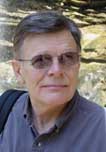Backstory
Authors tell you what inspired their work
Jim Tomlinson, author of "Things Kept, Things Left Behind"

I was born in a small town, and I've lived mostly in small towns. When I write, that's where my stories are set, in places like those I know. The fiction I've always enjoyed reading features working-class characters that play roles, often unwittingly, in each other's lives, Sherwood Anderson's Winesburg, Ohio, for example, or William Faulkner's Yoknapatawpha County stories. Living in a small town, you witness human drama -- comedy, tragedy, often a weird blend of the two -- acted out every day on street corners, in kitchens and churches and coffee shops.
The stories of Things Kept, Things Left Behind are set in and around the fictional town of Spivey, Kentucky. The details of the place -- the Appalachian foothills, the coal history of the place, the particulars of attitude, idiom and dialect -- may be peculiar to this place. But the stories told are stories of yearning, stories of the human heart, and in this they are universal.
I learned something interesting while writing these stories. A single character, no matter how quirky, no matter how brilliant an observer of life, no matter how animated or driven or put upon by circumstance, did not hold up well on the page. The stories that did catch fire were those in which two characters, both somehow driven, inhabited the pages. Like flint and steel, these, characters brought some elemental connection. Shared history had shaped their relationships. Then events of the story alter things, creating new stress on old ties.
There is a saying in playwriting that the scene is never about what the scene is about. So it is in Things Kept, Things Left Behind. The stories, ultimately, are about things not written, at least not overtly. The unuttered core of these stories, the invisible center around which they twine, is the conflict inherent in human connectedness, all the passions and incredible difficulties tangled there.
Individual stories have different origins. First Husband, First Wife, came from a small item in my local newspaper about a couple's drug case. What kind of characters would be in that circumstance? Why might a judge rule in that unusual way? In my story, the couple is Jerry and Cheryl, composites of people you see every day, oddly paired in a dance of want and need. Lake Charles, grew out of a moment, a brief encounter with two young men, brothers I guessed, in a pawnshop one Saturday morning. They were redeeming a hocked guitar. The younger man's jaw was deformed on one side, and he kept that side turned away from everyone except his brother. This became a story about fictional brothers, their symbiotic relationship, the hold of the "homeplace," and the allure of a young girl and the road. Paragon Tea tells the story of a father (not me) and the strained relationship with his son (not my daughter). The story is pure fiction, but it breathes my emotional truth. In Things Kept, adult sisters come together to help their willful, aging mother. It's a story of family secrets and shifting power relationships, a story that will be familiar to anyone with a family.
None of the stories in Things Kept, Things Left Behind began with me or with people close to me. They started with characters in circumstances not mine, creations of imagination hung with fragments stolen from life. And here is the amazing part. In the writing, things change. Story, after all, is about character yearning, about the complexity of relationships, about the troubled heart. And a writer has only one source for this material. In the end, I found that no matter where my stories were set, no matter who the characters were populating the pages, their internal landscapes were undeniably mine. And this, hopefully, fuels them, makes them burn, regardless of the origin of that first spark.
Jim Tomlinson is the author of the short fiction collection Things Kept, Things Left Behind (University of Iowa Press).

